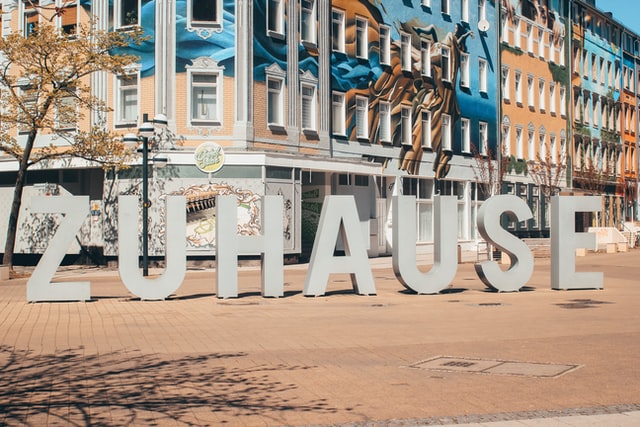Zuhause, zu Hause, Haus… What’s The Difference? Posted by Constanze on Feb 24, 2021 in Language
Guten Tag! Recently we have been talking on here about the home: das Zuhause. Or is it zuhause? Or zu Hause? Or even… das Haus? Heimat? Daheim?? What’s the difference?? If this topic confuses you, you’re not alone! In this post I will try to clear up the confusion surrounding all these different ways of saying the word ‘home’ in German.
Zuhause, zu Hause, Haus… What’s The Difference?
Das Zuhause
This noun is the closest translation to the English word ‘home’. When you talk about das Zuhause, you are talking about yours, or someone else’s, home: Er hat ein schönes Zuhause (‘He has a nice home’). Although it contains the word ‘Haus’ (German for ‘house’), Zuhause isn’t limited to houses themselves: an apartment can also be called das Zuhause, because the word’s translation is ‘home’, not ‘house’.
zu Hause
This is an adverb meaning ‘at home’. It’s talking more generally about home, rather than a person’s specific home. One example of how to use this is by saying you feel ‘at home’ somewhere: In Berlin fühle ich mich wie zu Hause (‘I feel at home in Berlin’). Another example is, Er wohnt noch zu Hause (‘He still lives at home’), referring to someone still living with their parents.
zuhause
This word (with a small z) is the same as zu Hause, above. They can be used interchangeably. Zuhause (with a small z) was introduced in the spelling reform as an alternative spelling to zu Hause.
das Haus
This means ‘house’, and usually refers to the building that makes up your home: ‘Das ist ein großes Haus’ (‘that’s a big house’), or ‘das Haus seiner Eltern’ (‘his parents’ house’), for example. Although you can use das Haus to talk about your home, there’s usually still the implication that you’re talking about your physical house: Ich gehe kaum mehr aus dem Haus (‘I am hardly leaving the house any more’).
Die Heimat
This is a uniquely German word that means ‘home’, but it refers more to the country, region, town or city you call your home. This can be the place you were born/grew up in, but it’s not necessarily so. Click on this post to read more about die Heimat.
Das Heim
This is another word that means ‘home’ in German, though it’s more commonly associated with care homes and other, similar places. Das Altenheim, for example, is the German word for an old people’s home, while das Wohnheim means dormitory, or hostel.
daheim
This is another way of saying ‘at home’; it’s pretty much the same as zuhause/zu Hause (see above). The difference is that the word daheim is regional; it is most commonly used in southern Germany, where it is pronounced ‘dahoam’ in Bavarian dialect. There is even a Bavarian TV series called Dahoam is Dahoam (‘Home is Home’).
I hope this has helped clear up any confusion you may have had surrounding these words! If you can think of any words that I missed out, feel free to drop them in the comment box below, and I’ll get back to you and/or write a follow-up post.
Bis bald (until next time)!
Constanze

Build vocabulary, practice pronunciation, and more with Transparent Language Online. Available anytime, anywhere, on any device.







Comments:
Sjoe!:
Hello Constanze!
What about “zuhaus” (zu Haus) with or without an apostrophe after the final “s” in the old (pre-WWI) soldiers’ song:
Wenn wir marschieren,
Zieh’n wir zum deutschen Tor hinaus.
Schwarzbraunes Madel,
Du bleibst zuhaus (zu Haus’? zuhaus’?)
Danke im Voraus. 😉
PS. Thanks a ton for your tips!
Constanze:
@Sjoe! Hi Sjoe, I believe zuhaus (without e) is more of a spoken shortened version of the word, hence it being used in songs such as the one you mentioned, but it wouldn’t be used in formal writing. I am not 100% sure, though, so do forgive me if I’m wrong on that one.
Shilpa:
Das was hier erklaert war,war gut.
Ich moechte auch also die Woerter Heirat,Ehe usw auch erklaert lassen
Constanze:
@Shilpa Danke!
Alex:
Hello Constanze, I speak French and live in Québec, Canada. I’m writing you about your Old German Handscript blog. My ancestor was German and I would like to ask you what would be your personal translation of his signature, back in 1773… Can I send you his signature so you can try to analyse it ? Thanks 🙂 Alex
Constanze:
@Alex Hi Alex, I’m not sure if the comment box will allow you to upload an image, but if so feel free to attach it here.